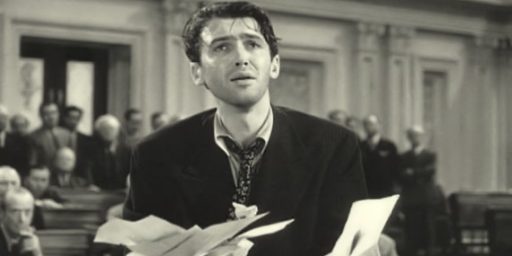How Powerful is Kamala Harris?
Could the Vice President end the filibuster herself?

MSNBC’s Hayes Brown offers the provocative argument that “Vice President Kamala Harris could kill the filibuster herself.” There’s a lot of setup, mostly drawn from the eighteenth century and therefore before modern precedents. But his overall point, that the actual text of the Constitution is incredibly murky on the powers of the VP as “president of the Senate,” is certainly correct.
As the vice presidency was debated in the closing days of the Constitutional Convention, Roger Sherman of Connecticut worried that the officeholder “would be without employment” if the senatorial duties weren’t tacked on.
It’s not a gig that Harris apparently relishes at the moment, though. The Los Angeles Times reported in January that her advisers would prefer that Senate Democrats find ways to avoid her having to cast tiebreaking votes all that often. They are, in fact, “hoping the Senate duties don’t distract from her other responsibilities and priorities too much, hindering travel, dominating her schedule or interfering with her ability to become an active player in the Biden White House.”
And, indeed, all indications thus far have been that, not only does Harris envision herself as very much a partner in a Biden-Harris administration but President Biden is at least willing to publicly go along with that idea.
Still, she’s likely to have little choice but be in the Senate chambers far more routinely than she’d prefer given a 50-50 partisan split and Republican Leader Mitch McConnell’s history of gumming up the works when in the minority.
So, given that there are surely 50 Republican votes against abandoning the filibuster with a Democratic President, Democratic House, and effective Democratic control of the Senate—and strong indications from at least two Democratic Senators that they won’t go along with the nuclear option—how does Harris do what the title suggests? Doesn’t she just exist as a tie-breaker?
Maybe not. As Brown details, there have been multiple instances over the years—although only none, in the last half-century—where major rules changes were implemented based solely on the ruling of the VP in his capacity as Senate President. The most recent case, while ultimately nullified, illustrates a path:
[Nelson] Rockefeller was presiding over the Senate in 1975 when a resolution to amend the cloture rule was introduced. Against the parliamentarians’ recommendations, he ruled that the measure could be enacted with just a majority.
The resulting debate wound on for days, with Sen. James Allen, D-Ala., putting up the staunchest fight. Finally, Rockefeller began ignoring Allen when he rose to speak, kneecapping the senator’s efforts. The choice wasn’t a popular one among some senators, even his fellow Republicans. “At the time, there was some public comment about reprisals by some Republicans, including a threat to vote against the president’s veto of legislation to suspend his oil import tariff,” The New York Times reported.
Eventually, the Senate’s leadership reached a compromise in which it essentially voided Rockefeller’s ruling, agreeing to reduce the vote requirement to 60 while leaving a two-thirds vote requirement to change the standing rules in place. The precedent that Rockefeller set may have been voided — or may not, there’s some debate still — but nobody questions whether he had the power to rule the way he did.
So, while the Rockefeller precedent isn’t exactly a precedent, it could have been. And, thus, Brown concludes,
While some parts of the stimulus relief package will be able to pass through budget reconciliation, other parts of Biden’s agenda absolutely won’t. Senate Minority Leader Mitch McConnell, R-Ky., is often considered to have the most knowledge about the Senate’s rules on the floor, and he has already promised to gum up the works whenever possible to prevent Democrats from moving ahead without Republican consent.
Harris should be ready and willing to use the powers she has to steer the Senate, if need be. I’m particularly taken with the idea that lawyer and author Thomas Geoghegan suggested in a 2010 New York Times op-ed: If the votes aren’t there to change the rules, the vice president “could issue an opinion from the chair that the filibuster is unconstitutional.”
That would certainly be one way to cut that Gordian knot.
Beyond that, Harris has other options for wielding more power in the Senate. With a united Democratic caucus on her side, any attempts to appeal and overturn Harris’ decisions would fail under Senate rules. Among the levers she should consider pressing is the ability to strip McConnell of many of the special privileges he has as minority leader, a precedent put into place by John Nance Garner, Franklin D. Roosevelt’s first vice president.
Or she could take up some of the reforms Theodore Roosevelt suggested in an 1896 article. “It might be well if in addition to his vote in the Senate in the event of a tie he should be given a vote, on ordinary occasions, and perchance on occasions a voice in the debates,” wrote Roosevelt, who would himself soon become a vice president who ascended to the presidency after the president’s death.
Ultimately, this strikes me as a frustrated pundit’s fantasy.
Surely, Harris wouldn’t do any of these things without Biden’s approval. And, while he has softened his stance on the matter since being elected, he’s an old Senator at heart and jealous of its institutions. Further, such a move would put the handful of remaining red state Democrats in the Senate in a perilous position. Indeed, I wouldn’t be shocked if Joe Manchin didn’t switch parties in protest.
Ultimately, while I think whatever utility it may have had is gone, I don’t see the filibuster going away absent a much more substantial majority. I do wonder, though, if it isn’t time for a 1975-style modification. Even changing the cloture requirement to 55 votes would be theoretically be helpful systemically without turning the Senate into a differently-elected version of the House.






Whatever method is used to get rid of the filibuster, it must be jettisoned. I often wonder at the people who simultaneously uphold the filibuster and then bemoan the fact that the Presidency has become imperial. One directly led to the other.
@MarkedMan: While I’m okay in theory with a filibuster as a check on enacting major societal changes on thin consensus, it’s a hard argument to make considering how undemocratic the Senate has become as an institution. And, combined with parliamentary-style lockstep party-line votes, a filibuster is just too much to overcome.
That said, while a frustrating legislative process might embolden Presidents to find workarounds, Congressional recalcitrance doesn’t chance the Constitution. Much of what Presidents have done unilaterally in recent years are, at best, extra-constitutional and quite like unconstitutional overreaches.
I’m pretty sure the framers were not actually intending to grant superpowers to the vice presidency. Whether it be the 1/6 crowd’s desire for the VP to declare the election null and void by only counting some electoral college votes, or this.
Any filibuster reform is realistically going to have to get the approval of Manchin and Sinema. I do wish people would stop forgetting about Sinema — is it just that she’s a woman?
I also don’t see Manchin switching parties. Yes, as Democrats go, he’s pretty conservative, but that’s just as far as Democrats go. The left-most edge of the Republican Party is much further away from him than the center of the Democratic Party.
He might go Independent-Caucuses-With-Democrats, but even that would just be symbolic… he really is the Democratic Party in West Virginia.
Looking at the picture on this post, with Harris’ dark hair and the mask, and the flattened contrast and low colors… she almost looks like she’s wearing a hijab. And she’s holding the gavel like a weapon.
I don’t this our hosts have any intention like that in mind, and probably just picked the image because it’s visually interesting, but I’m wondering where it comes from and where else it is getting used. The quickest google search doesn’t show anything…
Alas for some reason
I roll my eyes a little whenever someone comes up with XIX or XVIII century precedents and practices. Sure, some are still applicable, but most have been superseded by change sin norms, culture, and even law.
Remember when the pirates off Somalia were a big deal in the news? Many right leaning sites were chick-full of suggestions the government issue letters of marque, because, of course, we want modern-day privateers with armed shops roaming the sea lanes, hunting pirates and collecting rewards.
As to the filibuster, right now it works as a minority veto and a general brake on legislation. it’s no longer a toll of last resort against big changes on slim consensus, nor a tool to foster compromise between parties.
@Gustopher:
I had a similar thought regarding the image. The gavel though, the size of small sledge, one would need to be powerful to wield that. So it could be apt imagery in a discussion of VP power.
@James Joyner:
Please stop calling this “unconstitutional” when you really mean that you don’t like them.
Almost all the so-called “unilateral” executive authority wielded was done under direct grants of that authority by Congress and Congress can certainly overrule most of the Executive Orders by simply passing legislation.
______________________
@Kathy:
Rarely in this kind of area. If they have, the more modern laws or court opinions are cited.
The Senate has already become just a differently elected version of the House IMO. I can no longer see any difference in the rank partisanship between the two parts of Congress. Partisanship is all but a badge of honor for many in the current batch. “This is why we can’t have nice things” as my papa liked to put it.
The filibuster is a tool appropriate only for occasional, special, circumstances. Used as a matter of course on routine issues is to abuse the power.
@James Joyner:
I agree with you. The last attempt Congress made to pull back some power was the War Powers act, and that has been a paper tiger. Congress hasn’t declared war since 1942 (much to my surprise I just learned that it was against Bulgaria, Hungary and Romania!). The fundamental problem is that the President has a strong incentive to take charge, while any individual Senator or Representative has very little incentive to do anything but follow the lead of the President and reserve the right to carp about it later, hence the much weaker and often post-hoc authorizations to use military force. Heck, we invaded a country to “capture a criminal” (Panama, Noriega) and Congress did nothing. And then in 2001 Congress basically told the President you can do what you want in perpetuity as long as you call it terrorism. All of this seems extra-constitutional to me, since the whole purpose of giving the power to declare war to the Congress was to keep it out of the President’s hands, but the the Supreme Court has made it clear they want no part of this fight.
So while I agree with you that this is regrettable, it is the reality we deal with. Congress critters in general, and Republicans to a one, don’t want to go on record for or against anything but a hot button issue. They are happy to let the President do what he wants and then campaign against it. It would be much better for the country if these things were enacted by law, or defeated on the merits, but that doesn’t happen. The elimination of the filibuster created a very strong disincentive to buck the party line, since one or two votes from the opposition could often get a majority but if you need 5-10, well who’s gonna stick their neck up first? And the elimination of earmarks has removed the primary incentive. If my consitituency is reluctant about say, immigration reform, but I can come back home and say, “Yeah, I voted for it but it was the only way to get the new water bill passed” then I could be convinced to do the right thing (or the wrong thing – it cuts both ways).
@James Joyner:
I believe the filibuster is also extra-constitutional.
@Jon:
It might be extra-constitutional if we define that as “not in the constitution”, but I don’t see how it is unconstitutional. The Senate is free to choose their own rules. And one Senate cannot bind the next Senate by those rules.
@MarkedMan: That’s why I did not say it was unconstitutional.
I’m good with either of two conservative solutions:
One, revert to what we see as the traditional filibuster of Mr. Smith fame. You can keep talking as long as your adult diaper holds out or until 2/3 of votes cast shut you up. (They can still filibuster if they want, but with significant effort. And yes, it slows business, but it would be a huge improvement over the current situation, in which the Senate does almost no business. And the press could show a clip every now and again with an implied headline of “Fool Still Talking”, the current “filibuster” is virtually hidden from view. We wouldn’t have my pet peeve headline, “Bill fails 58-42” without explanation that it was 58 FOR.)
Two, and better, go back to the Founders intent as enshrined in the Constitution and original Senate rules. Shut off debate and force a vote with a simple majority of votes cast. How can Republicans reject the sainted Wisdom of the Founders?
@Kathy: Gee, I can’t imagine why we wouldn’t want privateers/letters of marque in the modern era. I mean, it wasn’t a particularly good idea back in 1803, and what’s the point of having a bad idea if not to enshrine it in American statecraft as a quasi/pseudo Constitutional norm?
@Gustopher:
Nope, it’s that she’s from a western state. 17 of Schumer’s 50-vote majority are from western states. Nine from interior western states. If all you read were the NYT or the WaPo, you’d never know they even existed.
@MarkedMan:
I don’t think that’s true at all. We have an Imperial Presidency because Congress (both the House and Senate) privilege partisan interests over institutional interests. Second, the legislation that is passed is intentionally vague and leaves almost all details up to the Executive Branch – that is what created the shadow legislature of the administrative state. Congress also has a long history of using this and other gimmicks to avoid responsibility which gives power to the Executive.
The one area where the filibuster is a factor is when it comes to some unilateral Executive actions. But that isn’t solely a or even primarily a problem with the filibuster either, particularly when there is divided control of the legislatures.
Anyway, I agree with James that Harris is unlikely to try. As he notes, it would probably be a pyrrhic victory for Democrats. From a purely tactical POV, it also doesn’t make a lot of sense considering a 50/50 Senate.
@Michael Cain:
I think there is truth to that. As I recall, you are also from Colorado, is that correct?
Another big factor is how online various politicians are. The news media and news cycle are in thrall to Twitter – politicians who are most active on Twitter and controversial there tend to get the most coverage. It’s also what gets them on Fox, MSNBC, and in front of the TV cameras.
@Andy: My argument is pretty straightforward: The filibuster makes it more difficult to pass any legislation, leading Presidents to go the Executive Order route rather than work the Congress. The Congress grouses about this but almost never enacts legislation to overturn the President.
@MarkedMan:
I think that’s fine as a general, broad argument.
I should have made it more clear, but what I objected to in your original comment is the assertion that: “One directly led to the other.” The filibuster is not inconsequential, but it didn’t lead directly to the overpowered Executive branch we have today in my view.
Give her Mjolnir instead of that wimpy thing. Then we can talk power.
Steve
And yet both parties love it whenever they have the WH. What’s more it relieves Congress of the responsibility to actually do anything. What’s not to like?
As I thought more about it, this kind of punditry has devolved into a “this one neat trick” meme.
When I see the photo of Kamala Harris with the mask I can’t help but think
“it doesn’t matter who I am, what matters is our plan.” 😀
@Andy: I agree. The filibuster contributed to the situation but wasn’t the sole cause.
@Gustopher: I was looking for a picture of her wielding the gavel in the Senate and it turned up. Ironically, it was the image from atop the MSNBC column that’s the basis for the post.
Because the Senate itself is essentially a gerrymandered institution, where representatives of a minority of Americans hold a majority of power, the filibuster exacerbates the situation immeasurably.
I am all for anything that can be done to reduce the power of the Senate overall, and in particular, measures that can reduce the power of an individual senator – who may directly represent only a few hundred thousand people.